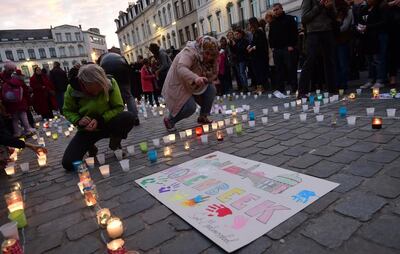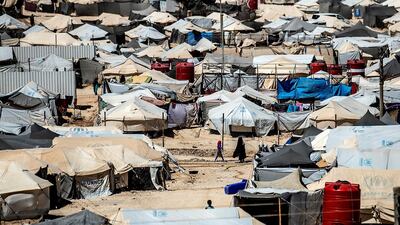Migrant routes across Europe used by ISIS terrorists who launched attacks on Paris could again be used by extremists, experts warn.
The migrant crisis was exploited by ISIS terrorists five years ago, as they sought to pass from Syria through Europe under the radar and pick up asylum seekers to fight for the Caliphate cause.
It is now feared these well-trodden paths will again be used in recruitment drives for the terrorist group.
The news follows an announcement this week by Kurdish-led authorities that up to 15,000 Syrians could be moved out of the overcrowded Al Hol camp in the north-east of the country, which holds displaced people and families of ISIS fighters.
The popular migrant routes came under the spotlight after the Paris terror atrocities in 2015, which killed 130 people and left more than 350 injured.
One of the attackers, Salah Abdeslam, is believed to have made four trips to Hungary during which he picked up other terrorists linked to attacks in Brussels and Paris.
Though some of these extremists’ names were on European counter-terrorism databases, many of them posed as refugees and carried fake Syrian passports to evade detection.
Terrorism expert Pieter van Ostaeyen believes extremists could continue to use these routes, especially with the imminent release of ISIS militants.
"It is a possibility they will use migrant routes," Mr van Ostaeyen told The National.
"If you look at the Paris attacks, we know that most of the terrorists went to Syria over land in cars and recruited local groups.
“Most of the Belgian fighters from Sharia4Islam used fake passports.
"Abdeslam used the migrant crisis in Europe in 2015 and managed to recruit many migrants, picking them up in Hungary and Croatia.
“One Belgian fighter was able to go to Syria four times, there and back, and it was only on the fifth time he was caught.
"They managed to stay under the radar and take advantage of the migrant crisis in Europe.

“Times have changed with the coronavirus pandemic. The freedom of movement will not be the same as a few years ago but the routes are still there.
"It is a possibility that some guys who disappeared from the grid after ISIS's last stronghold was taken might return. We know there are 150 Belgian foreign fighters unaccounted for."
Mr van Ostaeyen believes the terrorists will try to contact local crime networks for safe houses, cars, fake documents and weapons.
Hans-Jakob Schindler, director of the Counter Extremism Project think tank, said there could also be a major security risk with the movement of Syrians from Al Hol.
Mr Schindler said any radicals who are tempted to flee the camp could join the majority of Syrian migrants and head to Europe.
“There are a significant amount of Syrians in Al Hol who did not de-radicalise," he said.
"If anything they re-radicalised and will come out with a new furore in their ideological thinking."
Mr Schindler said these people were “extremely dangerous” and "pose a major threat to Europe".
Seven of the Paris attackers slipped through Hungary's borders while posing as migrants in 2015.
Hungary's counter-terrorism agency has revealed that the terrorists set up a logistics centre in the country to use paths through the Balkans, moving fighters trained in Syria into Europe.
In 2017, Belgium convicted 14 people of falsifying identity documents, some of which were sold to ISIS militants involved in the Paris and Brussels terror attacks.
The documents were used by Abdeslam and Najim Laachraoui, who blew himself up at Brussels Airport in March 2016.
Since then, more suspected ISIS terrorists are known to have arrived on migrant boats in Austria and Greece.
Under the Schengen Agreement of 1995, travel across borders without passport checks is allowed between 26 countries on the European mainland, leaving migrants free to travel across the continent without restriction.
Despite stricter border controls being introduced this year because of the coronavirus pandemic, there have been incidents of terrorists using the mandatory face masks to try to disguise their identity and pass through the continent.
In April, one of Europe’s most wanted ISIS terrorists, British rapper Abdel-Majed Abdel Bary, was found in Spain after he had arrived using the face-mask ploy.



